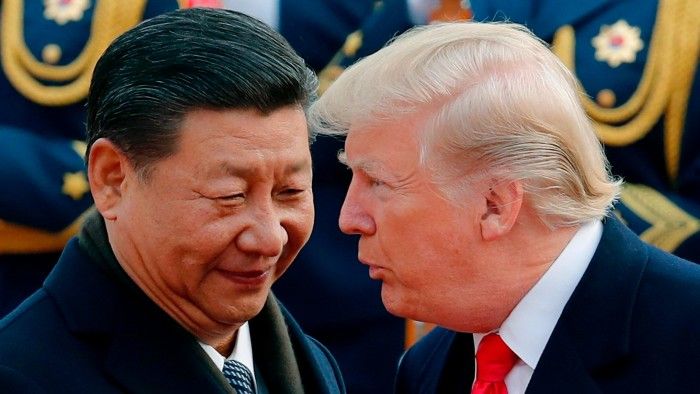In a shocking remark, Donald Trump said he would bomb China if it invades Taiwan. The bold statement reignites global fears over U.S.-China tensions.

Trump’s Fiery Warning Reignites Fears of U.S.–China War Over Taiwan
In a fiery and unfiltered statement that has sent shockwaves across global diplomatic circles, former U.S. President Donald Trump declared that he would bomb China if it dared to invade Taiwan. The comment, made during a town hall-style event in Florida, instantly sparked controversy and fear over the possibility of a catastrophic escalation in the already tense relationship between Washington and Beijing.
The former president, known for his blunt, often provocative rhetoric, did not mince words. “If China touches Taiwan, they’re gonna get bombed. No question,” Trump said, to loud applause from his supporters. “You don’t play nice with bullies. You punch them first.”
While Trump is currently a private citizen and not in office, his statement adds serious weight to the debate over how the United States should respond if China moves militarily against Taiwan — a scenario that military strategists and diplomats have warned could lead to the largest war in Asia in generations.
Why Taiwan Matters: More Than Just a Dot on the Map
Taiwan is more than just a small island near the Chinese mainland — it’s one of the world’s most critical geopolitical flashpoints. Beijing views Taiwan as a breakaway province and has repeatedly vowed to “reunify” it with the mainland, by force if necessary. On the other hand, the U.S. maintains a policy of “strategic ambiguity,” neither recognizing Taiwan as fully independent nor accepting Chinese claims over it.
Taiwan is also a global tech powerhouse, producing more than 60% of the world’s semiconductors. Any disruption in Taiwan would instantly rattle the global economy, especially in sectors like electronics, automotive, and defense.
Trump’s bombshell remark has therefore reignited fears of a full-scale U.S.–China war — one with economic, military, and human costs far beyond imagination.
What Trump Actually Said — And Why It Matters
During the event, Trump said:
> “Look, if you let them take Taiwan, they won’t stop there. First Taiwan, then the Philippines, then maybe even Australia. That’s how bullies work. If I were in office, I’d make it very clear — if China invades Taiwan, we bomb their fleet before they hit the shore.”
This wasn’t just campaign bravado — it was a clear hypothetical policy declaration. And it echoes Trump’s broader view of global affairs: dominance through intimidation.
He added that under his administration, China “wouldn’t have even dreamed” of invading Taiwan because they “respected American strength” — a direct jab at the Biden administration’s more measured diplomatic tone.
White House and Pentagon React
The Biden administration quickly distanced itself from Trump’s comments. National Security Council spokesperson Adrienne Watson stated:
> “The United States continues to support peace and stability across the Taiwan Strait. Hypotheticals involving military conflict only inflame tensions.”
Privately, however, some Pentagon officials expressed concern that Trump’s statement might undermine current deterrence efforts, or even embolden hardliners in Beijing who see U.S. instability as a green light to act.
Military experts say that while the U.S. has contingency plans for a Taiwan conflict, publicly declaring an intent to bomb China preemptively could escalate the situation unnecessarily.
China’s Response: “Dangerous Provocation”
Beijing wasted no time in responding. A spokesperson for the Chinese Foreign Ministry condemned Trump’s remarks as a “dangerous provocation that violates the One China policy.”
> “These irresponsible and inflammatory words show once again the deep hostility and ignorance of certain American politicians,” the statement read. “Taiwan is China’s internal matter. No foreign force will stop reunification.”
Chinese state media went further, warning of “grave consequences” and asserting that the Chinese military is “fully prepared to defend sovereignty.”
Analysts now fear that Trump’s words could fuel more aggressive Chinese military exercises near Taiwan, or increase pressure on the island through cyberwarfare, airspace violations, or naval intimidation.
Taiwan Caught in the Middle — Again
Taiwanese officials have been cautious in their response. President Tsai Ing-wen’s office simply reiterated that Taiwan “welcomes all international support for its sovereignty and democracy,” but stopped short of endorsing or rejecting Trump’s approach.
Behind closed doors, however, some in Taipei are likely uneasy. While Taiwan values U.S. military backing, Trump’s language could provoke China rather than deter it, placing Taiwan in even greater danger.
Taiwan’s people — most of whom support independence but fear war — now find themselves once again caught between two superpowers engaged in a dangerous verbal arms race.
What Could Happen If China Really Invades?
Experts say that if China invades Taiwan, the U.S. would face a painful decision: intervene militarily, risking war with another nuclear power, or stay out and risk its credibility with allies in Asia.
Trump’s “we’ll bomb them” stance removes all ambiguity. It simplifies a deeply complex issue into a binary — one that could trigger World War III.
Military analyst Lt. Col. James Clayton (Ret.) told us:
> “It’s easy to talk about bombing from a stage. But in real terms, bombing Chinese naval assets could trigger full retaliation, cyberattacks, even a nuclear confrontation. That’s not politics — that’s the apocalypse.”
My Take: Tough Talk Isn’t Always Smart Strategy
From my personal perspective, Trump’s statement, while dramatic, is not just political theater — it’s irresponsible and risky. In a world already teetering from wars, inflation, and distrust, adding “bombing China” to the mix is reckless.
Yes, the U.S. should protect its allies and deter aggression. But deterrence doesn’t always mean shouting threats from a podium. It means smart strategy, clear diplomacy, and military readiness — all aligned behind closed doors, not shouted in front of a crowd.
If China does invade Taiwan, it will already be a global disaster. Announcing bombing plans in advance doesn’t deter aggression — it may accelerate it.
Conclusion: Words That Could Change the World
Donald Trump’s declaration that he would bomb China if it invades Taiwan is more than campaign rhetoric — it’s a vision of how he might lead the world’s most powerful military if re-elected.
To some, this is strength. To others, it’s a recipe for catastrophe.
But one thing is certain: as tensions in the Taiwan Strait grow, every word from a U.S. leader — current or former — carries weight far beyond America’s shores.
